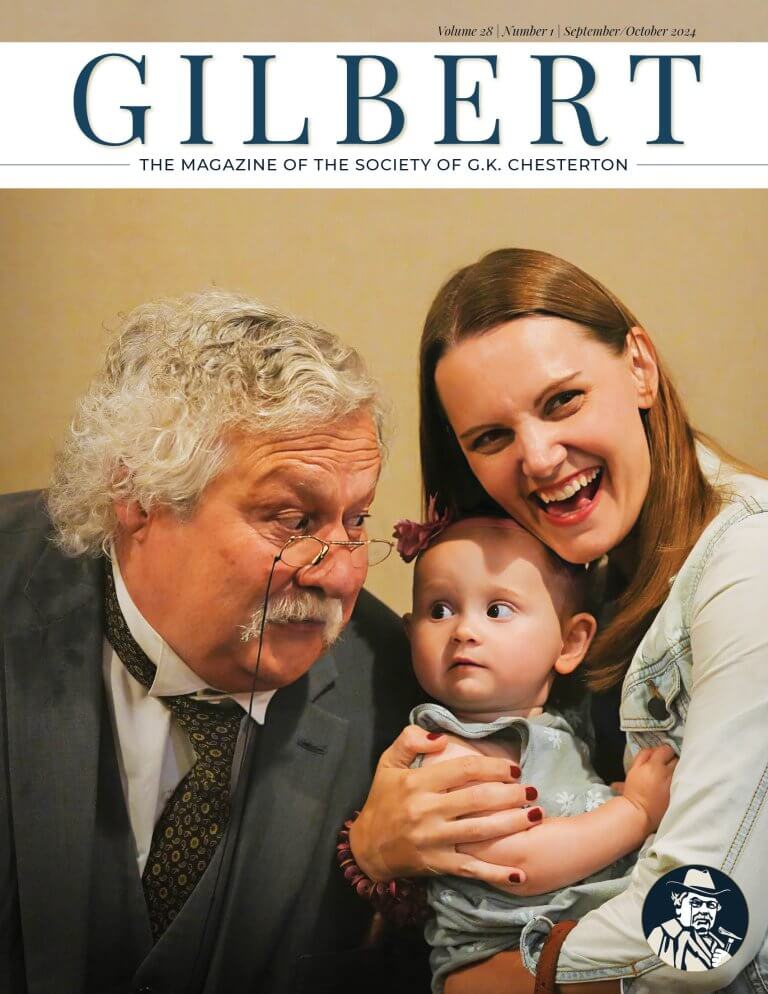There are more surprises in the past than in the future. That’s because the past keeps filling up and the future is still empty. When we look back, we see a mountain of material to be discovered, contemplated, and learned from. When we look ahead there is only a vast unknown. As G.K. Chesterton says, “I know as much about the future as you do, which is nothing.”
The modern approach to education is to chase fads and fashions that only flee; the classical approach is to build on tradition that always remains. But we cannot build on a false foundation. Tradition must be truth, not sentiment. The reason that the past is full of surprises is that the more we study it, the more we uncover the real stories that have sometimes been encrusted with accretions or clouded in romance. One such sentimental Christian romance that Chesterton points out is the idea “that all early Christians were like Christ, and that all later Pagans were like Nero.” Yes, there were demonic despots and heroic martyrs, but not every early Christian was persecuted and not every Pagan was a persecutor. To think so is to miss the most important point of the Christian revolution. The Doctors of the Church were the first to admit that the Pagans had virtues. Mercy and justice preceded Christianity. There were even Pagan vows of chastity and virginity. Chesterton argues that the moral revolution came when Christianity introduced and implemented another virtue; understandably the most unsung virtue. Humility. The Pagan had dignity, but even his dignity was filled with pride, and pride is “the enduring blunder of mankind.” It is “that monstrous and towering weakness.” Pride is the deadliest of the deadly sins. It even ruins the virtues. Humility is what makes the virtues possible.
Why do we bring this up? Because we should always bring it up.
At our July Chesterton Conference in Philadelphia, I pointed out that not only were we not in Philadelphia, we were in King of Prussia, which isn’t even a place. It’s just a shopping mall with its own zip code. The supreme irony is that we were holding a G.K. Chesterton Conference at an address named for the King of Prussia, Frederick the Great. Chesterton considers Frederick one of the great villains of history, a “Protestant who was not even a Christian.” And he loathes Prussianism as a patch of barbarianism in the civilized world. It fed the madness of Nietzsche with his racial pride and his hatred of morality, presuming to going “beyond good and evil.” And it culminated in Nazism, which was a “one-sided, savage tribal patriotism; and nothing else.”
The event which set the course of modern history was the meeting and perverse alliance between Voltaire and Frederick the Great. Voltaire’s skepticism and Frederick the Great’s pride have shaken the world to pieces. What the two had in common was “atheist irresponsibility.” Not believing in God means not being accountable to God – or to anyone. Liberty became license. License became tyranny.
“The spiritual zero of Christendom was at that freezing instant when two dry, thin, hatchet-faced men looked in each other’s hollow eyes and saw the sneer that was as eternal as the smile of the skull. Between them, they have nearly killed the thing by which we live.”
We are still fighting the King of Prussia. We are fighting pride. Whether it is Gay Pride, Racial Pride, Satanic Pride, or the pride of being right because someone else is wrong, pride “has risen again to do what it always does: to darken counsel, to confuse facts by confusing motives.”
We can look to the past to learn what battle we are actually fighting. But we can also look to the past to learn how to fight it. We can find the examples of pride and avoid repeating them. We can also find the examples of humility and emulate them.
G.K. Chesterton is an example of the latter. The late great Aidan Mackey described GKC as “a Tower of Humility.” Chesterton’s humility is evident in everything he writes. It is also evident in the stories about him. Shortly after he moved to Beaconsfield, he said to a fellow resident: “When I sit by the wayside, the villagers look and they take me for one of two things. They either take me for the village idiot or for one of Harrod’s delivery vans.”
“Humility,” says Chesterton, “is the mother of giants.” One of those giants is Chesterton himself. That is why he is such an important ally, an important advocate, in the battle we are fighting. We don’t know what the future holds. But we know, based on the past, what we have to do. “There is one moral matter in which we really can return good for evil without merely strengthening the evils; one weapon from the armoury of the saints is, even in a worldly sense, stronger than the world. That weapon is humility.”
Chesterton even wrote a hymn to inspire us. It is worth repeating:
O God of earth and altar,
Bow down and hear our cry.
Our earthly leaders falter,
Our people drift and die.
The walls of gold entomb us,
The swords of scorn divide.
Take not thy thunder from us,
But take away our pride.
ABOUT DALE AHLQUIST
Dale Ahlquist is President of The Society of Gilbert Keith Chesterton, a worldwide lay apostolate dedicated to Catholic education, evangelization, and the social teaching of the church. He leads the Society’s Chesterton Schools Network, which exists to inspire and support the creation of joyfully Catholic, classical, and affordable high schools around the world. Learn More






